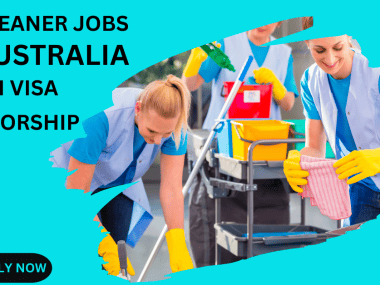Australia’s aging population has created a high demand for skilled caregivers, opening doors for foreign workers to secure rewarding roles.
With numerous visa sponsorship opportunities available, qualified caregivers can build fulfilling careers while gaining the chance to live and work in Australia, contributing to essential healthcare services in a supportive and multicultural environment.
Find out how to qualify for caregiver roles in Australia, locate care services and nursing homes offering visa sponsorship, and access application links—all in this helpful guide.
Eligibility Criteria and Requirements for Caregiver Jobs in Australia with Visa Sponsorship
To qualify for caregiver jobs in Australia with visa sponsorship, candidates must meet multiple requirements tailored to the responsibilities of the role and visa regulations.
These typically include:
- Educational Qualifications: A diploma or certificate in caregiving, healthcare, aged care, or nursing, such as Certificate III in Individual Support or an equivalent internationally recognized qualification. Some roles may require a higher qualification, such as a diploma in nursing or aged care.
- Relevant Work Experience: Prior experience in caregiving, aged care, disability support, or healthcare (typically 1–2 years) is preferred. Demonstrable hands-on experience in assisting patients with personal care, mobility, and daily activities is highly valued.
- Language Proficiency: Strong English communication skills, proven through tests like IELTS (minimum score of 5.0) or TOEFL, are usually required to interact effectively with clients and fulfill visa application requirements.
- First Aid and CPR Certification: Employers typically mandate current certifications in First Aid and Cardiopulmonary Resuscitation (CPR) to ensure caregivers are equipped to handle emergencies.
- Health and Physical Fitness: Caregiving involves physically demanding tasks such as lifting, assisting patients with mobility, and providing personal care. Candidates must demonstrate good physical fitness and overall health.
- Background Checks: A clean criminal record is mandatory. Applicants will need to provide a National Police Clearance and, in some cases, a Working with Vulnerable People Check or Child Safety Check, depending on the role.
- Eligibility for Visa: Candidates must qualify for a visa that permits caregiving work. The Temporary Skill Shortage Visa (subclass 482) or Working Holiday Visa (subclass 417/462) are common pathways. Employers must sponsor the candidate for specific skilled roles.
- Driving License: Many caregiving roles require caregivers to hold a valid driver’s license, especially for roles that involve traveling to clients’ homes or transporting patients.
- Vaccination Requirements: Up-to-date immunizations, including COVID-19 and influenza vaccines, may be required to comply with healthcare regulations.
- Cultural Competence: Strong interpersonal skills, empathy, patience, and the ability to work with individuals from diverse backgrounds are crucial. Employers often look for candidates who can adapt to Australia’s multicultural society.
- Professional References: At least two professional references are typically required, preferably from previous employers in caregiving or healthcare roles.
How to Find and Apply for Caregiver Jobs in Australia with Visa Sponsorship as a Foreigner
Follow this step-by-step guide to navigate the process effectively:
Step 1: Research Eligibility and Requirements
Start by understanding the qualifications and certifications needed for caregiver jobs in Australia. Common requirements include a Certificate III in Individual Support, relevant work experience, English proficiency (e.g., IELTS), and valid First Aid and CPR certifications.
Additionally, review visa options like the Temporary Skill Shortage Visa (subclass 482) or Working Holiday Visa (subclass 417/462) to ensure you meet the criteria for sponsorship.
Step 2: Search for Job Listings
Look for caregiver job opportunities through various platforms. Online job portals such as Seek, Indeed, and Jora are excellent resources, where you can filter results for roles offering visa sponsorship.
Specialized care job websites like Care Careers and HealthcareLink focus on healthcare and aged care roles. You can explore recruitment agencies like Hays Healthcare or Healthcare Australia that specialize in caregiver placements.
Additionally, visit the career pages of aged care facilities and nursing homes, including organizations like Bupa Aged Care, Anglicare, and Blue Care, to find direct listings.
Step 3: Prepare Your Resume and Cover Letter
Tailor your resume to highlight your caregiving skills, certifications, and relevant experience. Include details about your physical fitness, reliability, and ability to work with diverse clients.
Write a compelling cover letter explaining your interest in the role, your qualifications, and your willingness to relocate. Mention your readiness to meet visa requirements and emphasize your flexibility to adapt to the job’s needs.
Step 4: Apply for Jobs
Submit applications to as many listings as possible to increase your chances of success. Ensure you follow the application instructions carefully, attaching all required documents, such as your resume, cover letter, certifications, and passport details.
If you find a job listing that doesn’t specify visa sponsorship, consider contacting the employer directly to inquire about their sponsorship options.
Step 5: Attend Interviews
If shortlisted, prepare for the interview by researching the employer and understanding the caregiving role. Be ready to discuss your experience, physical fitness, and commitment to caregiving.
During the interview, clarify any questions about visa sponsorship, including the type of visa provided and the level of assistance the employer will offer.
Step 6: Secure a Job Offer and Sponsorship
Once selected, the employer will issue a formal job offer and initiate the visa sponsorship process. Review the terms of your employment, including salary, benefits, contract duration, and relocation support.
Step 7: Apply for a Work Visa
Work with your employer to apply for the appropriate visa. Submit all necessary documents, including your job offer letter, proof of sponsorship, medical examination results, and police clearance.
Visa processing times vary depending on the type of visa and the completeness of your application.
Step 8: Prepare for Your Relocation
Make your travel arrangements by booking a flight to Australia and securing accommodation near your workplace. Some employers may provide housing or assist you in finding suitable options.
Pack essential documents, certifications, and any work-related gear or uniforms required for your new role.
Step 9: Start Working and Settle In
Upon arrival, begin your caregiver role and settle into your new environment. Take advantage of any onboarding or training sessions offered by your employer to familiarize yourself with workplace procedures and expectations.
Adapt to your new surroundings and enjoy the opportunity to build a rewarding career in Australia.
Top Care Services and Nursing Homes Offering Caregiver Jobs In Australia With Visa Sponsorship
Several reputable care services and nursing homes in Australia offer caregiver roles with visa sponsorship for foreign workers.
Bupa Aged Care
Bupa is a globally recognized leader in healthcare, operating over 70 aged-care homes across Australia. They provide a supportive environment for caregivers and offer visa sponsorship for qualified candidates.
Bupa typically looks for caregivers with certifications like Certificate III in Individual Support, strong communication skills, and at least one year of experience in aged care. They emphasize ongoing professional development for employees.
To explore opportunities, visit the Bupa Careers Page.
Anglicare Australia
Anglicare is a trusted name in community and aged care services. With operations in multiple states, they actively seek caregivers with international experience to fill critical roles.
Visa sponsorship is provided to suitable candidates who possess caregiving qualifications, English proficiency (IELTS), and experience in assisting elderly or disabled individuals. Anglicare offers relocation assistance for foreign workers.
Check out current openings on the Anglicare Careers Page.
Blue Care
As part of UnitingCare Queensland, Blue Care is known for providing aged and community care services in rural and regional areas. They sponsor visas for foreign caregivers with relevant certifications and a willingness to work in less populated regions.
Blue Care emphasizes employee well-being, offering housing assistance, ongoing training, and flexible work arrangements.
Applications can be submitted through their Careers Portal.
Southern Cross Care
Southern Cross Care is a non-profit organization offering aged care, retirement living, and home care services. They recruit internationally to meet the growing demand for caregivers and often sponsor visas for foreign workers.
Applicants need caregiving experience, aged care certifications, and fluency in English. Their job listings are available on the Southern Cross Careers page.
Healthcare Australia (HCA)
HCA is a leading recruitment agency in the healthcare industry, partnering with aged care facilities to fill roles nationwide. They frequently offer visa sponsorship for international caregivers with experience in aged care, disability support, or hospital environments.
HCA provides training to help candidates meet Australian standards. Caregiver roles and visa sponsorship details can be found on their jobs page.
Regis Aged Care
Regis operates over 60 aged care facilities and is known for its employee-focused approach. They offer visa sponsorship to foreign caregivers who meet their criteria, including certifications like Certificate IV in Ageing Support and at least one year of caregiving experience.
Regis provides competitive salaries, professional development opportunities, and relocation assistance. Interested candidates can visit the Regis Career Page.
Opal HealthCare
Opal HealthCare is one of Australia’s largest aged care providers, operating over 80 homes across the country. They support visa sponsorship for caregivers with international experience and qualifications.
Opal is known for its career progression programs, allowing employees to grow within the organization.
To learn more, visit the Opal HealthCare Careers Page.
Estia Health
With over 70 aged care homes across Australia, Estia Health is a leading employer in the sector. They actively recruit foreign caregivers and provide visa sponsorship for those meeting their requirements, such as certifications, relevant experience, and strong communication skills.
Estia Health offers relocation packages and employee well-being programs. Visit the Estia Careers Page to explore opportunities.
Bolton Clarke
Bolton Clarke operates more than 40 residential aged care homes across Australia, offering a range of roles for caregivers. They sponsor skilled international candidates with experience in aged care and the required certifications.
Bolton Clarke is known for its supportive work culture and professional development programs. Visit the Bolton Clarke Careers Page for more details.
Life Without Barriers
Life Without Barriers is a non-profit organization offering disability and aged care services. They frequently recruit foreign caregivers for in-home care and support roles and provide visa sponsorship for suitable candidates.
Applicants with experience in community care and a passion for supporting vulnerable populations are highly valued.
Visit the Life Without Barriers Careers Page to find job opportunities.
The Average Salary for Caregiver Jobs in Australia with Visa Sponsorship
The salary for caregiver jobs in Australia varies depending on factors such as location, experience, employment type, and the specific industry or sector.
Here’s a breakdown of caregiver salaries across different categories in Australian dollars (AUD):
National Average
- Hourly Rate: Caregivers in Australia earn an average hourly rate of $25–$35, depending on qualifications and experience.
- Annual Salary: On average, caregivers make between $50,000 and $70,000 annually, with full-time roles often offering additional benefits like paid leave and superannuation.
By Cities
- Sydney: Caregivers in Sydney can earn $28–$40/hour, with annual salaries ranging from $55,000 to $75,000, reflecting the higher cost of living.
- Melbourne: The average hourly rate is $27–$38, and annual earnings typically fall between $52,000 and $72,000.
- Brisbane: Caregivers in Brisbane earn $26–$35/hour, with annual salaries of around $50,000 to $68,000.
- Perth: Salaries range from $25–$34/hour, with annual earnings of $48,000 to $66,000.
- Adelaide: In Adelaide, caregivers typically earn $24–$33/hour, equating to $47,000 to $65,000 annually.
By States/Territories
- New South Wales (NSW): Caregiver salaries average $27–$37/hour, with annual earnings around $54,000 to $70,000.
- Victoria (VIC): Average earnings are $25–$36/hour, or approximately $50,000 to $68,000/year.
- Queensland (QLD): Salaries range from $24–$34/hour, with annual earnings between $48,000 and $65,000.
- Western Australia (WA): Caregivers earn $25–$34/hour, with annual salaries around $50,000 to $66,000.
- South Australia (SA): Pay rates are slightly lower, averaging $24–$32/hour or $46,000 to $63,000/year.
By Employment Type
- Full-Time Caregivers: Annual salaries range from $50,000 to $70,000, with benefits like paid leave, superannuation, and professional development.
- Part-Time Caregivers: Hourly rates average $25–$35, with reduced benefits depending on hours worked.
- Casual or Contract Workers: Casual caregivers earn higher hourly rates, around $28–$40/hour, but may not receive standard benefits like paid leave.
By Experience Levels
- Entry-Level (0–2 Years): Hourly rates typically range from $24–$28, with annual earnings around $46,000 to $52,000.
- Mid-Level (3–5 Years): Caregivers with moderate experience earn $26–$34/hour, or $52,000 to $65,000/year.
- Experienced Professionals (6+ Years): Senior caregivers or those with specialized skills earn $30–$40/hour, with annual salaries reaching $60,000 to $75,000 or more.
By Industry/Division
- Aged Care Homes: Caregivers working in aged care facilities earn an average of $25–$35/hour or $50,000 to $70,000/year.
- Disability Support Services: Salaries range from $26–$38/hour, depending on the complexity of care required.
- Community Care: Caregivers providing in-home support earn $25–$33/hour, or about $48,000 to $68,000/year.
- Private Care: Caregivers hired by families or private agencies may earn higher rates, around $30–$45/hour, but these roles may not always include standard employment benefits.
Additional Considerations
- Overtime Pay: Many caregiving roles offer overtime pay, with rates typically 1.5x to 2x the base hourly rate.
- Remote and Rural Areas: Caregivers willing to work in rural or remote regions often receive higher pay and incentives like housing support.
- Specialized Roles: Those with advanced certifications, such as dementia care or palliative care, can earn premium rates, often exceeding $40/hour.
Benefits of Caregiver Jobs In Australia With Visa Sponsorship
Working as a caregiver in Australia offers numerous advantages, particularly for international workers.
Here are the benefits:
Competitive Salaries with Growth Opportunities
Caregiver jobs in Australia provide competitive wages, with hourly rates averaging between $25 and $35 and higher pay for specialized roles. Employers often offer annual raises, overtime pay, and bonuses for exceptional performance.
Visa-sponsored roles typically come with additional incentives, such as relocation allowances or housing assistance.
Visa Sponsorship and Immigration Support
Caregiver employers in Australia frequently offer visa sponsorship for international workers, simplifying the process of obtaining a valid work visa, such as the Temporary Skill Shortage (TSS) visa.
Many organizations assist with visa extensions or transitioning to permanent residency, making it easier for foreign caregivers to build long-term careers in Australia.
Job Security and High Demand
The demand for caregivers in Australia is increasing due to the country’s aging population. This high demand ensures job security and consistent work opportunities for qualified professionals.
Visa-sponsored caregivers are particularly valued as they help address critical workforce shortages in aged care and disability services.
Professional Development and Career Progression
Australian care providers invest in the professional development of their staff. Caregivers often receive training in areas like dementia care, palliative care, and advanced medical support.
Many employers sponsor courses, certifications, and workshops, enabling employees to enhance their skills and advance into supervisory or specialized roles.
Work-Life Balance and Flexible Scheduling
Caregiver jobs in Australia are designed to support work-life balance, offering flexible scheduling options like part-time, casual, or full-time work.
This flexibility allows caregivers to manage personal commitments while fulfilling their professional responsibilities.
Exposure to a Supportive Work Environment
Australian care organizations are known for their inclusive and supportive work cultures. Employers prioritize employee well-being, offering access to counseling, mentorship programs, and peer support networks. This fosters a positive and fulfilling workplace environment for caregivers.
Opportunity for Cultural Immersion
Working as a caregiver in Australia allows international workers to experience the country’s diverse culture, lifestyle, and natural beauty.
Many visa types, such as the Working Holiday visa, permit travel during employment, offering a chance to explore Australia’s cities and landscapes.
Access to Employee Benefits
Visa-sponsored caregiver roles often include a comprehensive benefits package, such as:
- Paid Leave: Annual, sick, and maternity/paternity leave.
- Superannuation: Employers contribute to retirement savings accounts.
- Healthcare: Subsidized or free health insurance plans for employees and their families.
- Housing Assistance: On-site housing or support for finding accommodation.
Opportunities in Regional and Rural Areas
Caregivers who work in rural or regional Australia benefit from higher salaries, relocation packages, and additional visa points for permanent residency applications. These areas provide a chance to engage with close-knit communities and experience a quieter lifestyle.
Pathway to Permanent Residency
Visa sponsorship for caregivers often serves as a pathway to permanent residency in Australia.
Employers may assist with transitioning from temporary work visas to permanent visas, making it easier for caregivers to establish a stable life in the country.
Frequently Asked Questions
How do I get a sponsorship visa for aged care in Australia?
To secure a sponsorship visa, apply to aged care providers offering visa sponsorship, such as those hiring under the Temporary Skill Shortage (TSS) visa (subclass 482). Ensure you meet qualifications, including certifications and experience, and pass health and background checks.
How can I migrate to Australia as a caregiver?
Caregivers can migrate through employer-sponsored visas, such as the TSS visa or the Employer Nomination Scheme (ENS) visa. You need a job offer, relevant qualifications, English proficiency, and the employer’s sponsorship approval.
What are the visa options for aged care workers in Australia?
Options include the TSS visa (subclass 482), Regional Sponsored Migration Scheme (RSMS), and Skilled Employer-Sponsored Regional (Provisional) visa (subclass 494). Some pathways, like ENS (subclass 186), offer permanent residency.
What qualifications do I need to be a caregiver in Australia?
The most common requirement is a Certificate III or IV in Individual Support (Ageing, Disability, or Home Care). Additional training in First Aid, CPR, and manual handling, along with relevant work experience, is often needed.
What is the new caregiver visa in Australia?
Australia recently introduced streamlined visa pathways for caregivers under the Care Workforce Labor Agreement, enabling faster sponsorship for roles like aged care and disability support workers.
How many hours can a carer work in Australia?
Caregivers on most work visas can work full-time (38 hours per week). Part-time or casual caregivers typically work fewer hours, depending on their agreement.
How can I apply as a caregiver in Australia?
Search for job openings on Australian job boards or employer websites. Tailor your resume, include certifications, and apply directly to providers offering visa sponsorship. Attend interviews and fulfill visa application requirements.
What is the age limit for aged care visa sponsorship in Australia?
Most employer-sponsored visas have an age limit of 45 years, but exemptions may apply, particularly for highly skilled or in-demand roles.
Is IELTS required for caregivers in Australia?
Yes, English proficiency is typically required. Most visas require an IELTS score of 5.0 or higher, though alternative tests like PTE or TOEFL may be accepted.
How do I sponsor a caregiver in Australia?
Employers must sign a labor agreement with the Australian Government, demonstrate a labor shortage, and meet sponsorship obligations. Once approved, they can nominate a caregiver for a relevant visa.




